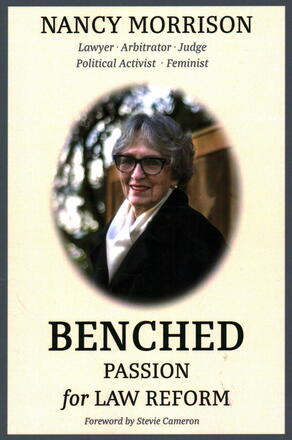
Benched
Passion for Law Reform
Description
Fifty years in a law profession she loves, twenty-four of which were spent as judge, Nancy Morrison has stories to tell. Being a former judge, Nancy could not have written this book during the 24 years on the bench. It is very much a political book, focussing on the need for law reform. Entertaining, at times warm and witty, it is also a memoir that reminds us of dark days. Nancy Morrison’s career spanned three provinces and two territories, as a lawyer, arbitrator and judge. Although the book has a light touch, it also nudges us on the social and political issues of the day.
Reviews
“Nancy Morrison, writes about her experiences on the bench with uncommon candour, intelligence and a welcome dose of humour.”— Jack Batten, The Toronto Star
“Nancy comes from an interesting background, not only in practicing law but being interested in social justice. Her great ability is understanding and describing how and why people behave as they do.“
— Hon. Anne Rowles, former judge of the
B.C. Supreme Court and the B.C. Court of Appeal“I never had to appear before Judge Morrison and I would like to keep it that way. Benched is a truly fascinating book — a must read — Nancy made me say that or face solitary.” —Vicki Gabareau
“Nancy’s memoir provides insightful observations on human nature, law, as well as cases and causes in which Nancy was involved, or led the way. A fascinating read.” — Hon. Patrick LeSage, former Chief Justice of the Ontario Superior Court of Justice